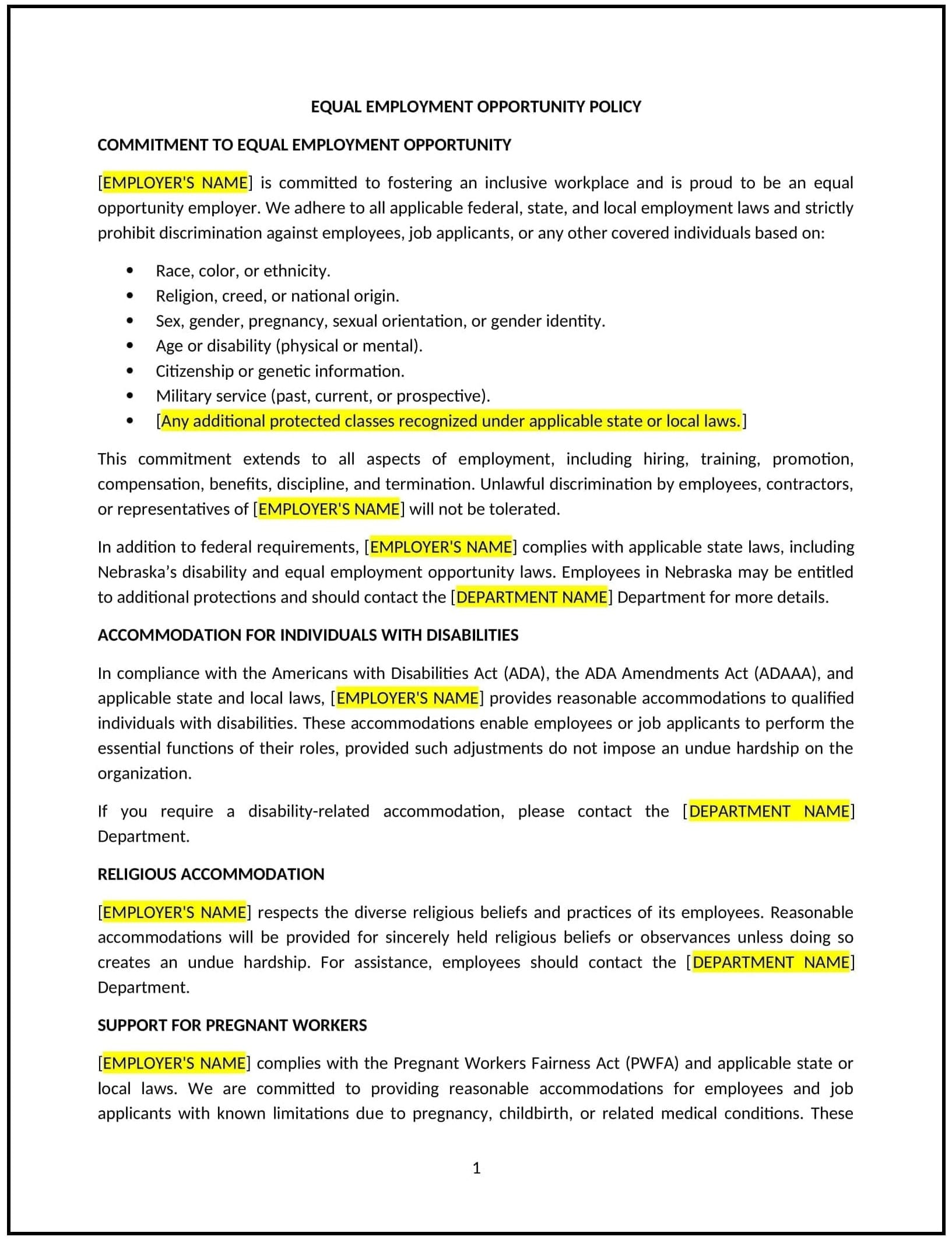Equal employment opportunity (EEO) policy (Nebraska)
Got contracts to review? While you're here for policies, let Cobrief make contract review effortless—start your free review now.

Customize this template for free
Equal employment opportunity (EEO) policy (Nebraska)
An equal employment opportunity (EEO) policy helps Nebraska businesses establish a commitment to providing equal employment opportunities to all employees and applicants, regardless of race, color, religion, sex, national origin, age, disability, genetic information, sexual orientation, or any other characteristic protected by law. This policy sets guidelines for non-discriminatory hiring, promotion, and employment practices, ensuring fairness and equality in all aspects of the workplace.
By adopting this policy, businesses in Nebraska can promote a diverse, inclusive, and equitable work environment, which can enhance employee satisfaction, attract a broader talent pool, and align with state and federal legal requirements.
How to use this EEO policy (Nebraska)
- Define the scope of the policy: Clearly state that the business is committed to providing equal opportunity in all aspects of employment, including recruitment, hiring, training, promotions, compensation, benefits, and termination.
- Identify protected categories: Outline the specific characteristics that are protected under the policy, including race, color, religion, sex, national origin, age, disability, genetic information, sexual orientation, and others that may be applicable under Nebraska state law and federal law.
- Address anti-discrimination and harassment: Specify that the business does not tolerate discrimination, harassment, or retaliation in any form. Outline the steps employees can take to report incidents of discrimination or harassment.
- Promote fair hiring practices: Ensure that hiring decisions are made based on qualifications, experience, and merit rather than personal characteristics that are irrelevant to the role.
- Provide for reasonable accommodations: Outline the procedures for providing reasonable accommodations for employees with disabilities or those who require accommodations for religious practices.
- Establish accountability and oversight: Assign responsibility for overseeing the implementation of the EEO policy and ensuring compliance with its provisions. This could include HR personnel, department managers, or a designated diversity officer.
- Encourage diversity and inclusion: Support diversity initiatives that promote a varied workforce and an inclusive workplace culture. Encourage employees to engage with and support these initiatives.
- Review and update: Periodically review and update the policy to reflect changes in state and federal law, as well as evolving business practices or employee needs.
Benefits of using this EEO policy (Nebraska)
This policy provides several benefits for Nebraska businesses:
- Promotes fairness and equality: An EEO policy fosters a workplace where all employees and applicants are treated fairly, leading to better employee morale and productivity.
- Enhances diversity: By committing to equal opportunity, businesses can attract and retain employees from diverse backgrounds, enhancing creativity, innovation, and problem-solving.
- Reduces legal risks: A well-implemented EEO policy helps businesses mitigate the risk of discrimination lawsuits, fines, or penalties associated with non-compliance with equal employment laws.
- Strengthens reputation: Companies that are committed to diversity and equal opportunity can improve their reputation, both as an employer of choice and as a socially responsible business.
- Improves recruitment: A clear and public commitment to equal opportunity can help businesses attract a broader, more qualified candidate pool, leading to better hires and improved organizational performance.
Tips for using this EEO policy (Nebraska)
- Communicate the policy clearly: Ensure that all employees are aware of the EEO policy and understand that discrimination, harassment, and retaliation will not be tolerated. Include the policy in employee handbooks, orientation programs, and on the company intranet.
- Train management and staff: Provide training on EEO principles, how to recognize and prevent discrimination, and how to report concerns. Managers and supervisors should be well-equipped to uphold the policy and foster an inclusive environment.
- Establish clear reporting channels: Set up accessible and confidential methods for employees to report concerns or complaints of discrimination or harassment. Ensure employees feel safe using these channels without fear of retaliation.
- Promote a culture of inclusion: Encourage open dialogue, celebrate diversity, and support initiatives that promote an inclusive workplace culture. This could include diversity events, employee resource groups, or mentorship programs.
- Monitor and assess progress: Regularly assess the effectiveness of the EEO policy, track diversity metrics, and identify areas for improvement. Use employee surveys, feedback, and other tools to gauge the inclusiveness of the work environment.